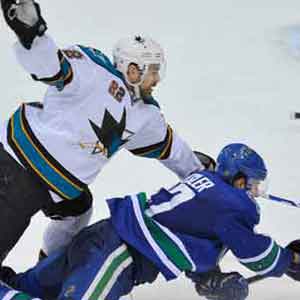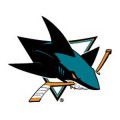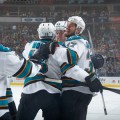The San Jose Sharks, a team that propelled the 10th biggest city in the nation through the spring yet left a legion of teal trembling in heartbreak, died on Tuesday in Vancouver. They were in the Western Conference finals.
When people look back on the 2010-11 season, they will say the Sharks gave it as good as they took it, which falls under the grudgingly acceptable category of a moral victory. The club’s 9-9 record in the postseason backs up that assessment, but the truth runs a bit deeper.
In past playoffs, San Jose’s players at times looked like a group of debutantes in skates, sailing along the ice like contact was only allowed after the third date. But this year was different. This year, the Sharks had an identity and left their garter belts in the gutter. Much of that could be attributed to where they came from.
A sluggish start back in the fall had many wondering if this was the year San Jose would be put out to pasture and slide into mediocrity like so many other also-ran contenders of the past. But a mid-season run made the Sharks the best team in the NHL for the second half of the season. Many began believing this could be the year by the time the club secured a fourth straight division title and No. 2 seed in Lord Stanley’s playoffs.
The team finished the regular season with 105 points, its lowest number since 2006, but momentum was on the Sharks’ side. A solid mix of young and old gave every fan, man or woman, a player to love or admire.
“Jumbo” Joe Thornton finally turned into the player everyone in the league, except his opponents, had hoped he would become. Logan Couture burst on the scene with exuberance of the Sundance Kid. Dan Boyle, Ryane Clowe and Douglas Murray all had the rugged appeal that made us feel like the Marlboro Man was watching the door and we weren’t about to be pushed around. And Patrick Marleau continued to be what we’ve always known he is—a damn good player who has his limits, but damnit, he’s ours, and we’ll curse him until we love him again. The list goes on, but the point is every fan of the team had a player they could identify with.
The Sharks moved through the first round of the playoffs, dispatching the Los Angeles Kings in six gritty games that immediately let everyone know the playoffs would be no cakewalk. The second round against Detroit was a bloodbath. Three wins in a row, three straight defeats, and then a Game 7 victory back here in San Jose.
In hindsight, the matchup with the Red Wings might have been the best seven-game series in NHL history. All but one game was decided by a goal, and the only one that wasn’t would have been were it not for a late open-net score.
The exhaustion of going toe-to-toe with Hockeytown had San Jose gassed to begin its series with the Canucks, which is a French-Canadian word for French-Canadians. From the start there was something off about Vancouver.
Who knew the Canucks had two evil, fire-crotched twins named Sedin that passed to each other like Satan tossing a hot potato from left to right. Things might have been different had a few bounces gone the other way—such as the puck that defied the laws of physics and went off the glass to Kevin Bieksa for a fluke game-winner in double overtime Tuesday—or if the ref had made a few better calls, or if, for the love of God and everything is holy, San Jose could have just sat on the puck for 13 more seconds at the end of the third period in Game 5.
But those are the breaks, and yet again they didn’t go San Jose’s way. If anything can be gleaned from another season up in smoke, it’s that the Sharks developed a new, stronger identity. As the Bay Area’s best sports radio man, Damon Bruce, likes to say: “Sports don’t build character, they reveal it.”
The season is over, but at least San Jose can look itself in the mirror and be comfortable with what it sees.

 Food & Wine Events: May 25-June 1
Food & Wine Events: May 25-June 1 


